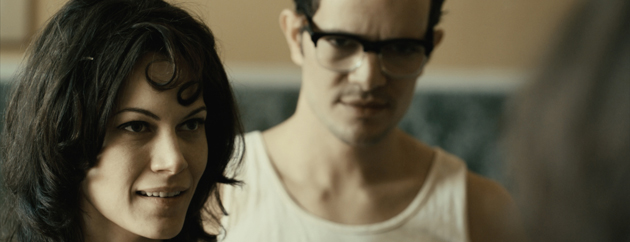
Boca
19 March, 2012The biopic of a thinking-mans’ criminal, set in mid-century Brazil, has a lot of potential given past cinematic triumphs based around the same theme. Unfortunately, the rise and fall of any gangster film plotline also applies to an audience’s interest level during director Flavio Federico’s handsomely shot, but ultimately dissatisfying, Boca.
The film is not without some real strengths. Hiroito de Moraes Joanides, played by Daniel de Oliveira framed in an iconic set of thick-rimmed specs, is an intriguing, thoughtfully portrayed character. Rather than glamorise or psychoanalyse his descent, more memorable are the intimate spaces we are invited into by the protagonist and his hotel-hopping, clandestine lifestyle.
He lives and works amidst the saturated tones of downtown São Paulo during the ‘fifties, renowned for its prostitution and drug crime – its cannibalism, even. Considered from the perspective of one man, we are not force fed the usual diet of panoramas and soundscapes. Instead, the infamous Boca do Lixo part of São Paulo is explored modestly, revealed sequentially, which is without a doubt one of the film’s biggest merits.
Choosing to focus solely on Hiroito, the dialogue is sparse instead of epic. Rather than shoot ‘em ups in the snooker hall, Boca is most powerful when it focuses on stolen, tragic snatches of conversation. These occur particularly between Hiroito and his middle-class family as they grieve the suspicious murder of their father, or with any woman that comes into his life. That is not to say that Flavio Federico is ploughing this infamous figure from Brazil’s past for psychological motives to explain his eventual demise. Instead, he embraces the biographical genre fully in its choice of visuals, inviting us to contemplate everything from the mundane – the drowning of an ant on a windowsill – all the way to the complex police operation that leads to his capture.
Yet, for all the beautifully composed and purposefully understated cinematography, in an attempt not to fetishise the poor environment in which it is set, we are left wondering what it is exactly that Federico wishes to say.
The consistent intimacy of most of the scenes, often only composed of small groups of Hiroito’s acquaintances, allow us an insight into the man behind the thick-rims, that is never voyeuristic enough to encourage judgement. Perhaps though, it is this decision not to pry too much that is the film’s downfall. Although a lot is said and shown, it never really comes to much. The opening sequences demonstrate that he is an avid reader of Baudelaire, but it is as if the name alone will suffice, rather than enquiring into any tangible influences. At best we are thrown the occasional trite idiom from a man we want to know more about on his own accord, rather than through the words of others. Similarly, we learn that Hiroito’s obsession with women was ignited by his early frequent visits to brothels, without ever really going much further. Neither are his refreshingly erotic, unusually sensual encounters with prostitutes throughout investigated.
This is not to say that the film must delve into his psyche because of its subject matter. However, much like the masterfully chosen hues of the camera shots, the portrayal of his relationship with women and academia serve as superficial decorations thrown on top of a tomb, rather than etchings on the gravestone itself, in what is at heart the exploration of a known figure’s life. If such aspects of his personal life are going to be used, they should be explored properly. As a result, the film never really decides what it is it wants to achieve, or say about the personality of Hiroito de Moraes Joanides.
He meets his drug-induced downfall as the attempts to control his territory become too demanding. Even the most crooked of cops turns on him and no number of well-connected allies can help. That said, an audience will find it hard to sympathise with Hiroito as we are never made privy to who he is exactly, nor are his entourage sympathetic enough for us to care about. As time rattles along, any sense of compassion dwindles and the anti-climactic arrest leaves a viewer not without affection for the film, but with a strong sense that something was lacking throughout. That sympathy for a criminal might not be the director’s aim is understandable enough, nonetheless, what his actual intention is remains unclear.
Boca is available on DVD and Blu-ray
Follow Sounds and Colours: Facebook / Twitter / Instagram / Mixcloud / Soundcloud / Bandcamp
Subscribe to the Sounds and Colours Newsletter for regular updates, news and competitions bringing the best of Latin American culture direct to your Inbox.

